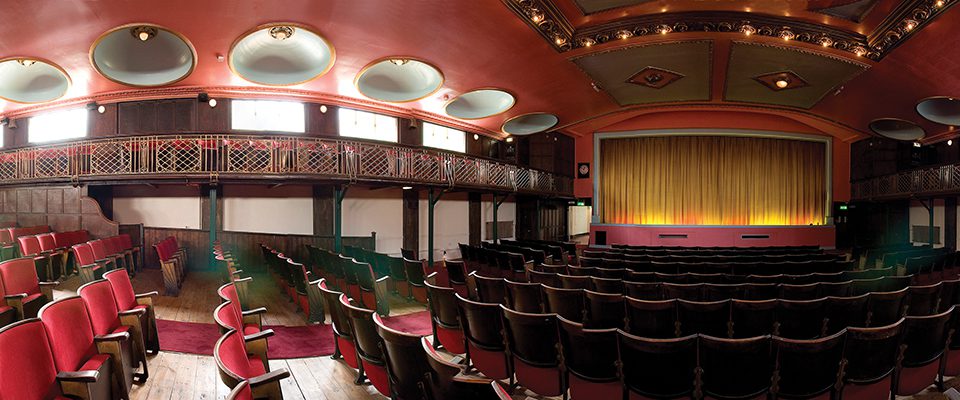Independent cinemas are offering a fresh alternative to the staid multiplex environment. Aesthetica explores the varied pastimes on offer around the UK
Before the 1960s, the cinema was the hub of the community, a lifeline to news from the wider world and the venue for a regular weekly treat. Before the days of television, cinema was a reliable, affordable source of entertainment and information, and as a result of technological advances, a cinematic presence in our lives has reduced considerably. Since the introduction of a plethora of multiplexes onto the cultural landscape in the 1960s and 1970s, independent film venues have dwindled in number around the country to the extent that these venues have become the exception rather than the rule. As with many other aspects of consumerism, the market has become dominated by an oligopoly of soulless entities, all offering huge numbers of screenings of the same repeated titles, a uniformity of experience regardless of venue, as Steve Jones from Nottingham’s Screen Room, the world’s smallest cinema suggests, “from my experience, multiplexes are using their screens to play the blockbusters more often and for longer. It doesn’t seem like they end up playing a larger range of films.”
In contrast to their conglomerate counterparts, Britain’s independent film venues remain as a few bastions to a bygone age scattered about the country, venues that Paul Homer, from Phoenix cinema says, “basically care about film as a medium.” From the Queens Film Theatre, the only arthouse and licensed cinema in Northern Ireland with its seasonal programming for festive enthusiasts and humbugs alike, through the faded nostalgia of Somerset’s Curzon Cinema, to the unique product of Cumbria’s Zefferelis offering a restaurant, cinema and jazz bar, independent venues are offering a more focused programming, a diversity of experience and a keener sense of vision for cinemas of the future.
These cinemas occupy an ambiguous territory between old and new. For many visitors, part of the appeal lies in the grandeur of the buildings, the legacy of generations of communities flocking towards their weekly entertainment, as Paul Homer acknowledges: “We’re nearly 100 years old, we’ve got a really beautiful Edwardian building, with a lot of art deco flourishes, it has a history that you can’t fake.” Proprietors are looking steadfastly to the future and continuing plans for their survival while a perusal of the Internet will show scores of community initiatives to save these local venues such as the long running, and passionately pursued “Save the Tivoli” campaign over 2007 and 2008.
The appeal of the independent cinema, and its survival, lies in the diversity of experiences offered. For Sarah Perks at Manchester’s Cornerhouse: “It’s rare for people to want to spend time in a multiplex environment, while we offer a place where there’s a range of experiences — you could buy a magazine to read in our café over lunch, surf the web using our free wifi, witness our young people’s group film a documentary, join a free gallery tour or attend an evening course introducing film studies.” This variety of experience also extends to the films on offer. Sarah Hughes from the Queens Film Theatre, argues, “it’s only in independent cinemas that audiences have a real choice — to see great new and classic films from all over the world, which is vital in supporting a truly vibrant film culture.”
A fresh perspective on programming has lent an indispensable reputation to many proprietors and this is something that David Stanning of Zefferelis plans to continue innovating: “We were the first people in the area to have opera films on, but now everybody’s started doing it so we’ve dropped out of it, but we’re hoping to do more things like that, special interest films.” Upcoming cinematic highlights around the UK include Glasgow Film Theatre’s ever-popular special programme of Festive Films; “people love the community sprit at these events, when the lights go up everyone cheers and claps,” says Seonaid Frame. Manchester’s Cornerhouse recently hosted Exposures: New talent in moving image, an annual student film and moving image festival, which has become a national event with a 15 year history, “an exciting combination of innovative new work, guest master classes, debates on the future of the industry and of course our infamous award night and party.” While the Phoenix hosts regular Q & A sessions with the likes of Terence Davies, Michael Palin, Mike Leigh and the League of Gentleman, “a whole host of people who support the cinema.”
Many believe these variations and reputations stand the independent venues in good stead for any tough economic times ahead. Seonaid Frame asserts: “Cinema tends to be recession free. Audiences are growing in independent cinemas year on year. Audiences want to be challenged, they want to be cultural, and the diversity of our programme is attractive to them. Having a unique and niche product attracts a wide range of audiences.” Quality is key as Sarah Hughes summaries, “historically, in times of economic depression, cinema has traditionally done very well as people need a good form of escapism from the real world and an economical good night out.” As people increasingly seek an alternative to corporate experiences and emphasise the unique and the local, independent cinemas, and their varieties of independent films on offer, are looking towards a renaissance.
Pauline Bache





